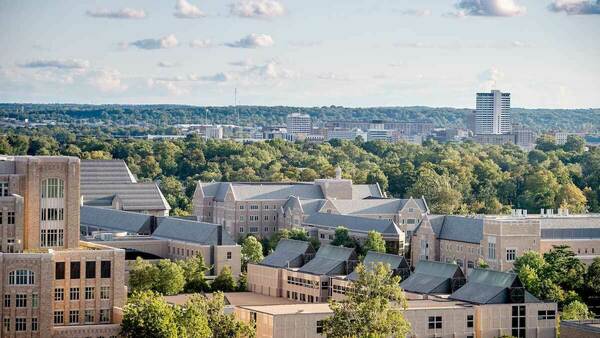

The city of South Bend will save $437 million under a revised plan to reduce the number of combined sewer overflows in the city to near zero by 2038.
The key?
“Smart sewer” technology developed by researchers in the College of Engineering at the University of Notre Dame and deployed and tested in South Bend in partnership with the city.
Michael Lemmon, professor of electrical engineering, and affiliated faculty member of the Environmental Change Initiative, and Jeff Talley, former professor of civil engineering and geological sciences, developed the technology to help cities with combined sewer systems comply with federal water quality standards in a cost-effective way.
With support from the IDEA Center at Notre Dame and the state of Indiana, the two later partnered with the city of South Bend and Luis Montestruque, then a graduate student at Notre Dame, to form EmNet, a smart water technology startup that provides real-time intelligence and optimization for smart sewer applications throughout North America.
The result of years of negotiations between the city and state and federal regulators, including the Environmental Protection Agency, the Indiana Department of Environmental Management and the Department of Justice, the revised plan leverages EmNet’s end-to-end wastewater technology to avoid massive investments in hard infrastructure and thus achieve the desired environmental benefits for far less than the original cost — $276 million compared with $713 million.
“These savings could not have been achieved without the technology and support from the University of Notre Dame,” said South Bend Mayor James Mueller. “These kinds of collaborations between higher education and the city provide real results for our residents and move our community forward together.”
Patricia J. Culligan, professor of civil engineering and the Matthew H. McCloskey Dean of the College of Engineering, said, “EmNet is a perfect example of how engineering know-how, developed at Notre Dame, can benefit our community of South Bend and others across the country. We’re thrilled to see this technology quite literally paying off for the good of so many.”
A combined sewer system is one that collects stormwater and wastewater in a single pipe and transports it to a plant for treatment and then discharge into a local waterway — in this case the St. Joseph River, which originates in southern Michigan and flows through South Bend on its way to Lake Michigan.
Common especially in older cities, such systems work well under normal conditions but overflow during periods of heavy rain or snowmelt, spoiling local waterways in violation of the Clean Water Act.
To prevent this, Lemmon and Talley collaborated with EmNet and South Bend to design a system that relies on a network of sensors to monitor the flow of stormwater and wastewater and, when necessary, divert it to areas of excess capacity within a combined system to reduce or prevent overflows entirely.
South Bend is among hundreds of cities in the U.S. under strict mandate from the EPA to reduce or eliminate combined sewer overflows at a cost of billions of dollars or face recurring penalties.
Under its original agreement with the EPA, the city pledged an additional investment of more than $700 million to reduce overflows to no more than 46.9 million gallons per year by 2031. Under the new plan, it will invest $276 million to almost entirely eliminate them by 2038.
EmNet was acquired by Xylem Solutions in 2018.
Speaking at the time, Montestruque, now senior adviser to Xylem, said, “We couldn’t be more pleased to be joining Xylem. From the beginning, EmNet’s vision has been to solve the most pressing wastewater challenges as effectively as possible. Joining Xylem empowers our team to greatly accelerate our progress and expand our mission to a global scale.”
A collaborative innovation hub, the IDEA Center is dedicated to expanding the technological and societal impact of Notre Dame research and innovations, with a focus on commercialization, entrepreneurship and education.
For more information, visit ideacenter.nd.edu.
Contact: Erin Blasko, assistant director of media relations, 574-631-4127, eblasko@nd.edu
Originally published by at news.nd.edu on August 25, 2021.